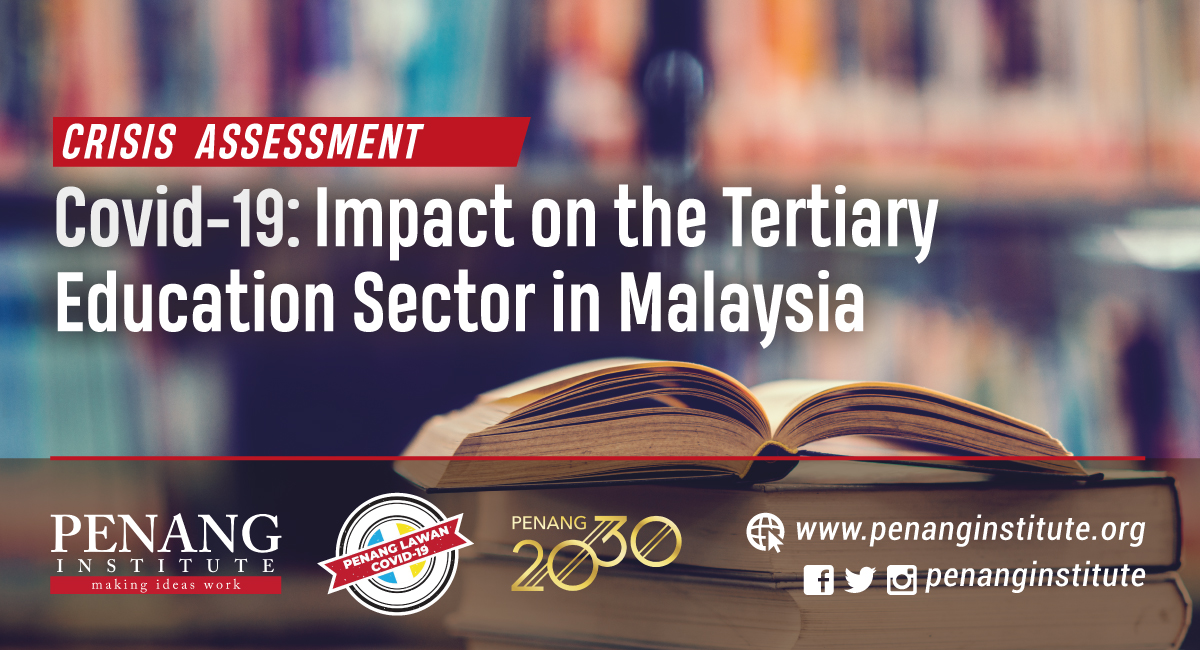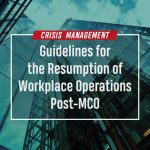EXECUTIVE SUMMARY
- Covid-19 and the subsequent Movement Control Order (MCO) imposed by the government has deeply impacted the tertiary education sector in Malaysia.
- Private colleges and universities in Malaysia will face financial pressure as enrolment of students is likely to be delayed or deferred.
- While full-time employees in tertiary education sectors face additional pressure to manage the disruptions, contractual staff members risk unemployment.
- Even if classes can move online, challenges remain. For example, scientific research and classes that require a laboratory setting will be impacted. Examinations which constitute a component of the overall evaluation of students also cannot be postpone indefinitely.
- Some flexibility is needed by the authorities involved at all levels, and additional measures have to be in place to minimize disruptions in the tertiary education sector. Emphasis on digital education is a clear step forward but this has to be complemented with better cyber security.
- Tertiary education institutions also need to increase support for less-privileged students.
INTRODUCTION
The Covid-19 outbreak has impacted businesses of all sizes and industries of various kinds. The higher education sector is not exempted. In United Kingdom, university staffs especially contractual staffs have been dismissed abruptly to cut costs.[1] Across the world, lectures and tutorials have had to be moved online swiftly, ongoing lab research halted and enrolment of new students has deferred or delayed. Almost all student exchange programmes and academic conferences have had to be cancelled.
The Covid-19 has posed significant challenges to the tertiary education sector. This Critical Assessment piece discusses the impact of Covid-19 on the tertiary education sector in Malaysia.
FINANCIAL IMPACT
Due to the high infection rate of Covid-19, the Malaysia government imposed a Movement Control Order (MCO) from 18th March onwards. Besides essential services, almost all economic activities were not allowed to operate.
But even as the government eased the MCO by allowing most economic sectors to operate starting on the 4th May, the Higher Education sector remained closed. Such a long period of closure of any tertiary education institute is quite unprecedented in Malaysia, and cannot but have a detrimental impact.
Like any other business, colleges and universities will be facing financial pressure because of Covid-19. Prior to the pandemic, the economic growth of the higher education sector had already shown worrying signs. In early April this year, the Asia Sentinel reported that research done by Professor Geoffrey Williams, a former deputy Vice Chancellor at University Tun Razak showed that 55 percent of Malaysia’s private higher education institutions were making trading losses and around 44 percent were financially insolvent. The only way that the majority of private universities and colleges had been able to continue operating was through new funds and/or equity injections by shareholders.
As such, the Covid-19 crisis is potentially catastrophic for private universities and colleges because most private universities and colleges in Malaysia rely on receiving student fees to stay afloat. With the crisis, it is highly possible that prospective students may defer or delay their studies. Besides the fear of the pandemic, the looming economic recession will also mean that some parents may struggle financially. Some may not be able to afford tuition fees for their children. Enrolment of foreign students may also decrease because of government control over the inflow of foreigners to avoid imported Covid-19 cases. Inevitably, this puts further strain on the cash flow of the institutions.
Public universities will most likely have to review their annual budget. It is not entirely impossible that the government, despite having allocated an annual budget to the higher education ministry may review the situation, given the current situation. Non-essential programmes like conferences, seminars or invitation of foreign speakers are likely to be cancelled. Academic staff may also face greater difficulties in applying for internal grants for research or conferences. Likewise, plans to upgrade facilities may have to be postponed.
CHALLENGES WITH ONLINE TEACHING
Many universities and colleges were forced to make swift changes to move to online teaching when MCO was imposed. But this comes with several challenges. First, even if students and lecturers can get pass the technical difficulties, one cannot assume that all tertiary students enjoy unlimited internet access or possess laptops or desktops that allow them to attend online classes freely. The Internet Users Survey 2018 conducted by the Malaysian Communications and Multimedia Commission, for example, found that there is a sizeable disparity between urban and rural internet users. Urban users make up for 70.0 % Internet users.[2]
Second, coverage and speed of internet also vary depending on one’s budget and location. Hence, it is likely that some tertiary students, especially those who reside in rural areas, do not enjoy internet access, or sufficiently good internet access, the way most of their peers who live in urban areas do. These students run a high risk of being left behind if classes are entirely conducted online.
The quality of teaching will definitely be impacted as well. By and large, most private and public tertiary education institutions in Malaysia have relied on face to face lectures and tutorials. Tutorials are especially important for students as this is the time for smaller groups of students to discuss their lecture, to debate ideas and to present their work. It is also the time when lecturers can properly evaluate the students’ performance; class participation usually constitutes but a small component in the overall evaluation of students. Besides the content of the courses, tutorials are also meant to let students practice presentation skills. Although this can be done via online teaching, the quality of interaction will be compromised; the spontaneity possible in the lecture hall is likely to be lost.
For students and researchers in the science stream, online classes simply cannot replace face to face teaching nor help in their research. This is because experiments and researches of science students are mostly done in the laboratories. All the necessary equipment or tools can only be found in the laboratories. Thus, ongoing research of postgraduate students will be compromised. Besides, for those whose research involves organisms, with the MCO, some of their organisms may not survive. For research work that are dependent on seasonal changes, it would also mean that researchers have to delay their research for possibly a year.[3]
ASSESSMENT HURDLES
Moving classes online will also pose assessment hurdles. Although a lot of assignments can be completed at home, examination constitutes a sizable component of the overall assessment. Tests are usually done in rooms or halls, and it is impossible to gather hundreds of students to sit for their exams as long as the risk of Covid-19 exists. Even if universities or private colleges are willing to postpone the exams to prevent the congregation of students, they cannot defer it indefinitely. The alternative is to conduct online exams. However, the risk of cheating is high especially when they cannot be monitored in person. For instance, an at-home computing exam at the National University of Singapore (NUS) went awry when some students took advantage of the Covid-19 measure to cheat.[4] Besides the risk of cheating, given that some Malaysian tertiary students still have trouble with internet accessibility, the country is simply not ready to move towards online exams.
ADMINISTRATIVE CHALLENGES
Administrators in the tertiary education sector will also face difficulty in reorganizing the schedules of their respective schools. It is inevitable that schedules, semesters, enrolment of new students, and hiring of new staff will all be affected because of the MCO.
In general, most universities and colleges have well-planned yearly schedules with stipulated months dedicated to semester breaks. These well-planned schedules are critical to operations running smoothly throughout the semester. Most importantly, it ensures that students complete the courses that they signed up for.
Semester breaks are also an important part of the education schedule, and allows for students to attend student exchange programmes or internships. Academic staff also need them in order to catch up on their research and writing. However, with the MCO, these schedules have certainly been disrupted, and university administrators face challenges in rescheduling. Not only do they have to minimise disruptions in working on the new schedules, they also have to ensure that conditions at their campus are arranged to stop Covid-19 transmission.
IMPACT ON EMPLOYEES
Employees in the tertiary education sector will also be affected by Covid-19. Academic staff will have to learn to be comfortable with teaching online and to navigate the technical challenges of online classrooms, while non-academic staffs will have to find ways to minimize disruptions.
Untenured professors, contractual staff and international staff will face greater employment uncertainty. Contractual staff such as sessional lecturers, and part-time researchers already face employment uncertainty as a matter of course, even before Covid-19. Unlike permanent staff, many part-time or contractual staffs do not enjoy social security or any other benefits such as insurance coverage or employment provident funds. They are also dependent on whether the courses they teach are being offered in that particular semester. Other times, the continuance of their contract is dependent on the favour of their direct superiors. However, when universities or colleges have to save costs, it is highly likely that contractual staff are the first to go.
Besides, one should not underestimate the mental stress that the staff have to face. Academic staff not only learn online teaching, perhaps even tweaking their lessons, managing students’ questions and complaints as well as marking papers, they also have to be more responsive to the students’ queries. This would mean a more proactive approach in responding to students’ emails on top of learning how to do online teaching. For those in the applied sciences in particular, it would be even harder for the academic staff to teach since they cannot use the tools in the laboratories. Meanwhile, non-academic staffs will have to manage the schedules, complaints and incessant queries from students and staff. All in all, the disruptions will increase the mental stress and raise the possibility of burnout among tertiary education employees.
IMPACT ON STUDENTS
Inadvertently, the students will also be negatively affected. To reiterate, the quality of teaching will be compromised as students can no longer enjoy the interaction in the lecture halls and tutorial rooms. In an online setting, it is harder for students to ask questions in a non-invasive way. In a lecture hall or tutorial room setting, everyone can observe each other’s body language and have eye contact. Such a setting is usually more conducive for debates and discussions. It is also through such a setting that students can listen to their peers’ contribution and continue their discussions outside the formal classes. However, an online classroom is not as conducive to such discussions.
Students from less-privileged backgrounds in particular will suffer even more. Their challenges include the lack of resources such as a computer to work, photocopy machine, internet access and a quiet space to study. But when students have to move back to study from home, they no longer enjoy these facilities. When at home, some students may also be distracted by family responsibilities.
Postgraduate students, especially those from the science stream will be most affected as they cannot work in their laboratories. Not only may they not be able to graduate on time, they would also have to worry about their finances and prospects of employability.
In all, one can surmise that the disruption caused by Covid-19 imposes additional mental stress and financial concerns for students. As many can no longer attend the traditional lectures or utilise the facilities in their schools, they may be tempted, at least those who can afford to do so, to purchase laptops and subscribe to a better internet package to minimize disruption. Hence, should online teaching last for a longer period, the less-privileged students will likely to suffer longer. One cannot rule out an increase in the rate of students dropping out from college. Above all, students who do not have strong social support will be most susceptible.
RECOMMENDATIONS
Online teaching has to be continued as long as the risk of Covid-19 exists. However, some degree of flexibility should be allowed. For instance, universities and colleges can allow staff to go to campus on staggered schedules to record their lectures and to settle their administrative work. Certainly, clear SOPs such as temperature checking, social distancing should be followed.
Students should also be allowed to meet their lecturers on appointment basis. Meetings can be conducted in an open space instead of a confined office and where physical distancing is maintained. This would truly help students who have a hard time adapting to online teaching. Less-privileged students should also be given the option to apply for additional assistance such as application to use facilities provided by the school. The school can then issue special passes for these students and stipulate that they can only be on campus for a specific period of time per day. Such arrangements will not only help in crowd control but also ensure that the less-privileged students will not fall behind.
At the administration level, sanitisation and disinfection will need to be conducted regularly. Markers also have to be pasted on floors to guide social distancing. Posters of hotlines for hospitals and counselling should also be visible for staff and students. Students or staff who need counselling should be encouraged to seek counselling services to avoid burnout.
Beyond the short-term measures, the entire tertiary education industry will have to innovate to thrive in a post Covid-19 scenario and many of these measures will need to be supported by the government. Malaysia’s new higher education director-general, Datuk Seri Dr Mohamed Mustafa Ishak has stated a wish to boost digital education post-Covid-19.[5] While this is the right direction to go, this has to be complemented with affordable and reliable internet package and wider coverage in various parts of Malaysia. As classes move online in the foreseeable future, the government will need to tighten cyber security to defend computers, electronic systems and networks from malicious attacks. Recruitment of digital forensics have to be increased to support tertiary education institutions.
At the college or university level, educators will need additional training in the use of online teaching tools and recording tools. Above all, universities and colleges will have to allocate additional funding to subsidize less-privileged students.
Post-MCO scenario, each school or faculty will also have to establish a crisis response team consisting of faculty members, student representatives, and senior administrators. IT should also be made compulsory for senior management staff to attend crisis management and crisis communication seminars to help them better prepared for black swan scenarios.
CONCLUSION
The Covid-19 has certainly impacted the tertiary education industry. Tertiary education institutions in Malaysia faced financial losses, disruptions in schedules and ongoing classes while staff and students face additional stress. In the medium term, rising unemployment among contractual staff is to be expected as tertiary education institutions find ways to cut costs.
Covid-19 has also widened the disparity between the privileged and less-privileged students. More than ever, the Higher Education Ministry needs to consult all public and private tertiary education institutions in Malaysia to navigate the post Covid-19 world. Universities and colleges also need to be better prepared for unexpected crisis situations.
[1]“Hundreds of university staff to be made redundant due to coronavirus”, The Guardian, viewed 5 May 2020 , https://www.theguardian.com/education/2020/apr/02/hundreds-of-university-staff-made-redundant-due-to-coronavirus
[2]Malaysian Communications and Multimedia Commission. 2018. Internet Users Survey 2018: Statistical Brief Number Twenty Three. Cyberjaya: Selangor Darul Ehsan
[3]Kimbrough L. “Field research, interrupted : How the Covid-19 crisis is stalling science”, Mongabay, viewed 5 May 2020 https://news.mongabay.com/2020/04/field-research-interrupted-how-the-covid-19-crisis-is-stalling-science/
[4]“Asian universities face online assessment hurdles in virus crisis”, The World University Rankings, viewed 6 May 2020 https://www.timeshighereducation.com/news/asian-universities-face-online-assessment-hurdles-virus-crisis
[5]Rajaendram R. “New Higher Education DG aims to strengthen sector”, The Star, viewed 7 May 2020 https://www.thestar.com.my/news/nation/2020/05/06/new-higher-education-dg-aims-to-strengthen-sector#cxrecs_s
You might also like:
![Covid-19 Set to Aggravate Malaysia’s Skills Mismatch]()
Covid-19 Set to Aggravate Malaysia’s Skills Mismatch
![Transforming Tourism in Penang: Suggestions for the Short and the Long Term]()
Transforming Tourism in Penang: Suggestions for the Short and the Long Term
![Guidelines for the Resumption of Workplace Operations Post-MCO]()
Guidelines for the Resumption of Workplace Operations Post-MCO
![The Heavy Impact of Covid-19 on the Agriculture Sector and the Food Supply Chain]()
The Heavy Impact of Covid-19 on the Agriculture Sector and the Food Supply Chain
![Covid-19 Hits the Heart of George Town: A Survey of the Economic Situation of Old Trades in the Hist...]()
Covid-19 Hits the Heart of George Town: A Survey of the Economic Situation of Old Trades in the Hist...







